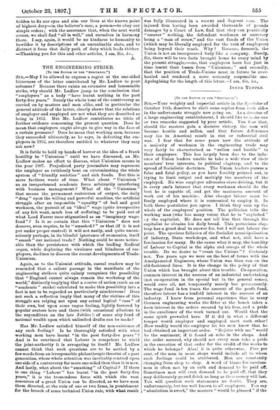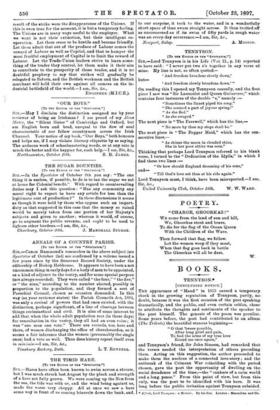THE ENGINEERING STRIKE.
[TO TILL EDITOR OF TH2 " SPLCTATOR."]
Sin,—May I be allowed to express a regret at the one-sided bitterness of the letter contributed by Mr. Ludlow to your -columns P Because there exists an extensive and lamentable strike, why should Mr. Ludlow jump to the conclusion that " employers" as a body "have learnt nothing in the past forty-five years." Surely the whole tone of the controversy as -carried on by masters and men alike, and in particular the general attitude of the latter, clearly shows that the relations of employer and employed are not what they are described as being in 1852. Bat Mr. Ludlow contributes no tittle of further evidence concerning the present question. Does he mean that employers ought always to give way in the face of -a certain pressure ? Does he mean that working men, because they succeeded ultimately, as he says, in defeating the em- ployers in 1852, are therefore entitled to whatever they may ask now?
It is futile to hold up hands of horror at the idea of a frank hostility to " Unionism " until we have discussed, as Mr. Ludlow makes no effort to discuss, what Unionism means in the year 1897. Prejudiced party journalists may represent -the employer as ruthlessly bent on exterminating the whole 'system of "friendly societies" and sick funds. But this is mere factious waste of time. What about " Unionism " as an inexperienced academic force arbitrarily interfering with business management ? What of the " Unionism " that means the permanent restriction of output, the daily " drag " upon the willing and powerful machine, the artificial struggle after an impossible " equality " of bad and good workmen, the pursuit of an "ideal" wage (quite irrespective of any felt want, much less of suffering) to be paid out of what Lord Farrer once stigmatised as an "imaginary wage- fund" P Is it so certain that this "Unionism" does not deserve, even require, to be "smashed P" or that (if it is not put under proper control) it will not easily, and quite uncon-sciously perhaps, in its blissful ignorance of economics, itself
'" smash" our national trade ? Nothing could be more notice- able than the persistence with which the leading Radical organ, while deploring the virulence and blindness of em- ployers, declines to discuss the recent developments of Trade- Unionism.
Again, as to the Unionist attitude, casual readers may be reminded that a salient passage in the manifesto of the engineering strikers quite calmly recognises the possibility that "England cannot always remain the workshop of the world," distinctly implying that a course of action (such as an academic" strike) calculated to make this possibility into a fact is not to be regarded as particularly mischievous! Does not such a reflection imply that many of the victims of this struggle are relying not upon any actual logical "case" of their own, but upon some vague feeling, lightly fostered by popular orators here and there (with occasional allusions to the expenditure on the late Jubilee !) of some airy fund of national wealth upon which unlimited drafts can be made?
Has Mr. Ludlow satisfied himself of the non-existence of any such feeling ? Is he thoroughly satisfied with what working men have learnt "in the past forty-five years " ? And is he convinced that Labour is competent to wield the joint-authority it is arrogating to itself ? Mr. Ludlow cannot think that such questions are to be settled by a fewwords from an irresponsible philanthropic theorist of a past generation, whose whole attention was inevitably centred upon one side of a controversy far more one-sided then than it is now. And lastly, what about the "smashing" of Capital P If there is one thing "Labour" has learnt "in the past forty-five years," it is the tremendous force with which the vast resources of a great Union can be directed, as we have seen them directed, at the ruin of one or two firms, in punishment for the breach of some technical Union rule, with what result
was fully illustrated in a recent and flagrant case. The injured firm having been awarded thousands of pounds damages by a Court of Law, find that they can practically "recover" nothing, the defendant workman or secretary being a "man of straw," and the vast fends of the Union (which may be liberally employed for the ruin of employers) being beyond their reach. Why ? Because, forsooth, the Union is not an incorporated body like a company. Surely, Sir, there will be two facts brought home to every mind by the present struggle,—one, that employers have but just in time learnt their lesson from " Unionism ; " and secondly, that the position of Trade-Unions must in future be over- hauled and rendered a more seriously responsible one. Apologising for the length of this letter. —I am, Sir, &c., INNEE TEMPLE.
[TO THE EDITOR OP THE "SPECTATOR.]
SIR,—Your weighty and impartial article in the Spectator of October 16th, deserves to elicit some replies from 130th sides in the unfortunate struggle now going on. As a director of a large engineering establishment, I should like to make one or two remarks suggested by your article. You fear that, should the masters gain a decisive victory, the men will become hostile and sullen, and that future differences may (as in America) result in riot or industrial civil war. I fear that for some years now the attitude of a majority of workmen in the engineering trade may very fairly be characterised as "sullen and hostile" to their employers. This has largely been due to the influ- ence of Union leaders unable to take a wide view of their members' true interests, to political claptrap, and to the spread of Socialistic doctrines. The Union leaders pursue a false and fatal policy, as you have forcibly pointed out, in trying to limit output and multiply the numbers of the employed. No wise employer advocates slave-driving, but it is every one's interest that every workman should do the best he is capable of, and get the maximum amount of work out of his machine. Also cheaper labour must be freely employed where it is economical to employ it. In both these postulates you agree. I think they sum up the whole of the employers' position. The politician tells the working man (who has many votes) that he is " exploited " ey the capitalist. He does not tell him that through the capitalist he obtains his daily bread. This pernicious clap. trap has a great deal to answer for, but I will not labour the point. The specious fallacies of the Socialist municipalisation of industry, State workshops, and what not, still have a fascination for many. Be the cause what it may, the hostility of Labour to Capital is the alpha and omega of the whole trouble. Do we desire to "crush the Unions " P Certainly not. Ten years ago we were on the best of terms with the Amalgamated Engineers, whose Union was then run on the old-fashioned lines. It is the change in the policy of that Union which has brought about this trouble. Co-operation, common interest in the success of an industrial undertaking (not co-operation in the special but in the general sense), would cure all, not temporarily merely but permanently. The wage fund is ten times the amount of the profit fund, therefore labour has a tenfold interest in the success of an industry. I know from personal experience that in many German engineering works the fitter at the bench takes a keen interest in the orders secured by his firm, and a pride in the excellence of the work turned out. Would that the same spirit prevailed here. If it did in what a different temper would employer and employed meet each other ! How readily would the employer let his men know that he had obtained an important order. "Rejoice with me" would be the sentiment, if it found an echo in the shops. And the order secured, why should not every man take a pride in the execution of that order for the credit of the works to which he belongs ? Alas! it is quite otherwise. Five per cent. of the men in most shops would include all to whom such feelings could be attributed. Men are constantly changing from shop to shop. A word of blame for careless- ness is often met by an oath and demand to be paid off. Sometimes men will even demand to be paid off, that they may deliberately go and drink as long as their money will last. You will question such statements no doubt. They are, unfortunately, but too well known to all employers. You say "absolutism is sweet," the masters "would be pleased" if the result a the strike were the disappearance of the Unions. If this is even true for the moment, it is but a temporary feeling. The Unions are in many ways useful to the employer. What we want is not their extinction, but their intelligent co- operation. Let them cease to be hostile and become friendly. Let them admit that out of the produce of Labour comes the reward of Labour as well as Capital, and that to hamper the most fruitful employment of Capital is to limit the reward of Labour. Let the Trade-Union leaders strive to learn some- thing of the trades they control, let them make it their aim to contribute to the prosperity of those trades, and it is no doubtful prophecy to say that strikes will gradually be relegated to Saturn, and the British workman and the British merchant will hold their own against all corners on the in- dustrial battlefield of the world.—I am, Sir, &c.,
ENGINEER (111.I.C.E.).











































 Previous page
Previous page